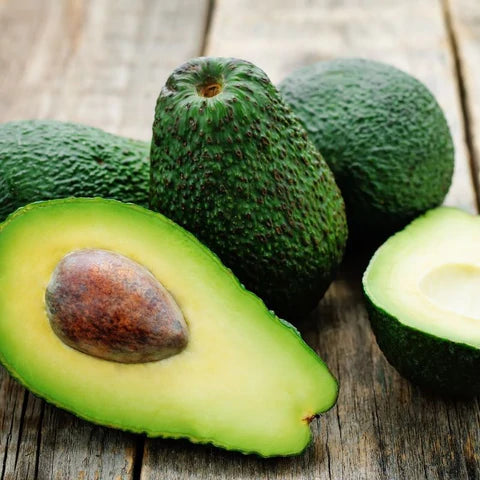
Food Focus - Avocados
'Food Focus - Avocados'
Avocados may be one of the best flab-fighting fats that help to balance out your hormones, control your appetite and even provide high levels of healthy fibre, vitamins, minerals, and antioxidants. However, it's unlikely that you'll eat an entire avocado in one sitting. Most people usually have at least half an avocado left over. So how do you prevent that avocado half from turning brown?
First, let's discuss why avocados turn brown. Like apples or potatoes, they oxidize when exposed to air. Once you cut into an avocado, you'll never be able to completely stop the oxidation process. But you can slow it down dramatically with a few quick tips and tricks:
1. Cut the avocado with a ceramic or plastic knife. Metal actually accelerates the oxidation process.
2. Citric acid is a powerful antioxidant. Rub a little lemon or lime juice around the exposed flesh and you'll significantly delay the browning effect.
3. No lemon or lime? Use oil – another great buffer to oxygen, and the perfect replacement for lemon or lime juice when you don't have any handy.
4. Store in an airtight container. Avocados turn brown due to oxidation and exposure to air, so storing in an airtight container makes perfect sense.
5. Water. Yes, really! This tip works exceptionally well for leftover guacamole. Place it into a storage container and press down to remove any air pockets. Add a half inch of water on top, and seal with an airtight lid. The water creates a barrier between the avocado and the air, keeping your guacamole fresh and 100% green for 24 hours or more. When you’re ready to finish it, simply drain away the excess water, then enjoy. I do this all the time, and trust me, it works like a charm!
Health Benefits
Heart health
Almost two-thirds of an avocado’s calories come from heart-healthy oleic acid – a monounsaturated omega-9 fatty acid, like those found in olive oil. Much research suggests that monounsaturated fats, like those found in the Mediterranean diet, are associated with reduced cardiovascular diseases.
Antioxidant health – Avocados are rich in Vitamin C, copper and the enzyme superoxide dismutase, all of which support the reduction of harmful free radical activity. Certain research has discovered that one avocado a day in a heart-healthy diet increased plasma antioxidants and decreased oxidation of small, low-density lipoprotein (LDL) in overweight/obese adults.
Bone Health – Avocados are also a good source of Vitamin K, which activates a variety of clotting factors. Certain bone proteins have been found to be dependent on this vitamin, too. These proteins are important for the process of bone mineralization which creates structural integrity.
The components present in the monounsaturated fat oleic acid exert an influence on certain inflammatory markers such as interleukin-6 and tumour necrosis factor, both of which are proinflammatory agents in the body. Furthermore, certain components such as phenols are associated with intestinal health, as they stimulate a higher biodiversity of beneficial gut bacteria.
In addition to these heart-healthy essential fats, avocados also contain concentrated levels of fibre, B6, folic acid and potassium.
Nutrient Outline
Yet another benefit is that the nutrient content of avocados serves as an enhancing element for carotenoids and lycopene, which are found in tomatoes, for example. Maybe that’s why guacamole and salsa make such a perfect partnership!
How all of this fits into your nutritional goals really depends upon your individual programme, and whether it has room for certain levels of fat. That said, more recent research from top cardiologists in the UK suggests a complete revision on public health advice about fats and government guidelines. Researchers in a long-term intervention with an unrestricted-calorie, high-vegetable-fat Mediterranean diet found an association with decreases in body weight – and less gain in central adiposity – compared with a control diet. These results lend support to advice to not restrict intake of healthy fats for body weight maintenance.
A 2,000-calorie intake, with 30% coming from fat, would mean 600 of the day’s calories could come from fat – about 67g. As a guide, one half-cup of mashed avocado contains around 184 calories and 18.90g of total fat.
If you’re keen to introduce more avocado to your diet, here’s a great-tasting smoothie recipe. It’s perfect as a snack to get some extra fuel on an exercise day, or as a great (and portable) FMD transition day/lighter day breakfast. Simply blend and enjoy!
AVOCADO BANANA BERRY SMOOTHIE
Half a ripe avocado
1 frozen banana
4 to 5 frozen or fresh strawberries
200ml of nut milk (Alpro Coconut/Almond)
Pinch of cardamom
Pinch of allspice

